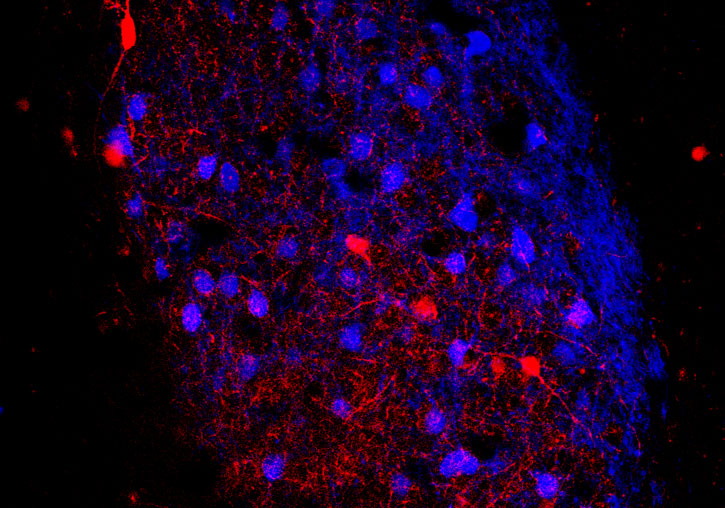A very stressful event can alter the long-term neural connections of the cerebral amygdala
- Scientific Culture and Innovation Unit
- February 21st, 2022

A study carried out by researchers from the BIOTECMED Institute of the University of Valencia (UV), the Mental Health CIBER (CIBERSAM) and the Research Foundation of the Clinical Hospital of the Valencian Community (INCLIVA) reveals that a single highly stressful event can alter in the long term the inhibitory neurons (a type of nerve cell with a very important role in regulating the functioning of neural circuits) of the cerebral amygdala.
This research, published in the journal Progress in Neuropsychopharmacology & Biological Psychiatry, analised for the first time in mice about the long-term effects of an episode of intense stress on the cerebral amygdala, a structure located inside the brain that is primarily responsible for the formation and storage of memories associated with emotional events.
Juan Nácher, Professor of Cell Biology at the UV and coordinator of the study, explains: “The study of these effects is particularly interesting because there is ample evidence on the prominent role of the basolateral amygdala complex in the acquisition of fear conditioning and the response to stress”. The CIBERSAM researcher also adds that the basolateral amygdala “plays a critical role in psychiatric disorders and is extremely sensitive to stress”.
Scientists focused on the impact of stress on different populations of neurons in the basolateral complex of mouse brains and caused a significant impact on the density, structure and connectivity of parvalbumin-expressing cells (PV+). These inhibitory neurons appear to be especially involved in the etiopathology of various psychiatric disorders, including generalised anxiety disorder, depression, and post-traumatic stress disorder. “Our results reveal significant long-term effects of a single stressful event on the inhibitory circuits of the basolateral amygdala, especially those involving PV + neurons and their plasticity”, says the research team.
In addition, the use of transgenic mice in this study also showed that these long-term effects of intense stress “have a different impact depending on whether inhibitory neurons are involved in circuits that promote or inhibit the response to fear”, according to research. On the other hand, they also pointed out effects differentiated according to sex, being especially relevant in female mice, they point out.
Article:
Pesarico AP, Carceller H, Guirado R, Coviello S, Nacher J. “Long term effects of 24-h-restraint stress on the connectivity and structure of interneurons in the basolateral amygdala”. Prog Neuropsychopharmacol Biol Psychiatry. 2022 Apr 20; 115:110512. doi: https://doi.org/10.1016/j.pnpbp.2022.110512
File in: Recerca, innovació i transferència , Difusió i comunicació científica , Facultat de Ciències Biològiques , Grups de recerca , Finançament recerca , Internacionalització recerca , Investigació a la UV



















